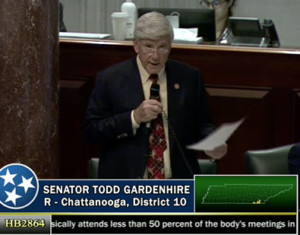Three bills improving open government laws clear House and Senate
Three bills that improve open government have cleared both the House and Senate.
One will improve the transparency of public meetings of hundreds of state boards and commissions. Another brings more transparency to deaths that occur in local jails and state prisons. And the third clarifies language in the public records law that sometimes causes confusion over ID requirements and the responsibility of the government to search for records.
Tennessee Coalition for Open Government worked with the sponsors and other advocates on these bills.
Electronic meetings of state boards and commissions

Sen. Todd Gardenhire, R-Chattanooga, on the Senate floor on April 7, explains his bill that will improve transparency and citizen access to state board and commission meetings that are held electronically.
SB 2889 / HB 2864, sponsored by Sen. Todd Gardenhire, R-Chattanooga, and Rep. Tim Rudd, R-Murfreesboro, marks a turning point in state board meetings that are held using electronic means.
The Open Meetings Act already authorized such boards to allow their individual members to participate in meetings electronically and the entire board to meet electronically under certain circumstances, such as by video conference.
The bill updates the law to require that the governing bodies record all meetings that are held with electronic participation. The recording or a link to the recording must be posted on the website that contains information about the governing body’s meetings within three business days and maintained for three years.
The legislation also requires that the governing body provide a way for citizens to remotely view and listen in real-time to such meetings. The governing body also must provide a way for citizens to provide public comment via electronic means when public comment is normally allowed.
The bill defines electronic means of communication as “communication by video conference or audio conference and may include the use of an internet-based platform, but does not include email.”
The bill also applies to emergency communication district boards, which are covered under the same law as the state boards and commissions.
The change will bring more transparency to the work of dozens of state boards and commissions that use electronic means to conduct meetings. For example, the bill applies to state university boards, environmental oversight boards, and such closely watched boards as the state election commission and state historical commission. It applies to all state boards, including the new board that oversees the Megasite Authority of West Tennessee, which was created to manage a state-owned site for auto manufacturer Ford Co. Some state boards already provide the public access required in the bill but many do not.
The amended bill passed both the House and Senate unanimously.
“This bill requires state boards and commissions and emergency communications district boards that are authorized to meet electronically to provide a way for the public to view or listen to their meetings in real-time by electronic means as well,” Gardenhire said while presenting the bill on the Senate floor. “The bill will bring Section 108 of Open Meetings Act regarding electronic meetings up to present-day technology.”
Gardenhire noted that the changes would not expand or diminish the ability of governing bodies to use video or audio conferences for meetings.
“It simply creates better public access for those governing bodies who are already authorized to do so,” he said.
Transparency about deaths in county jails and state prisons
SB 2802 / HB 2613, sponsored by Sen. Kerry Roberts, R-Springfield, and Rep. Jeremy Faison, R-Cosby, requires that local jails and state prisons maintain a public record of deaths of individuals in their custody. The records must be open for public inspection.
The amended bill states that the jail or prison record must include:
- The identity and age of the deceased individual;
- The time and date of the death; and
- The cause of death as determined by the county or state medical examiner pursuant to § 38-7-109
Sen. Roberts, in presenting the bill on the Senate floor, said that the bill codifies what should already be best practice in jails and prisons.
Sen. Jeff Yarbro, R-Nashville, thanked Roberts for the bill but asked why the amendment had deleted language from the original bill that also required the jails and prison to provide the “facts concerning the death of the individual that are in the possession of a government entity, provided that information that is relevant to an ongoing investigation may be redacted.”
Roberts said that the sheriff’s association had asked to remove that part of the bill because of the complication that some of those facts may still have to be adjudicated, but that perhaps the issue could be revisited later.
Signing on as co-sponsors of the legislation were Sen. Ken Yager, R-Kingston; Rep. G.A. Hardaway, D-Memphis; Rep. John Crawford, R-Bristol and Kingsport; and Rep. Larry Miller, D-Memphis.
Currently, jails and prisons are required to report deaths in custody to the Tennessee Bureau of Investigation, but the new legislation would assure that information is accessible to citizens locally from the jail or prison where a person died. In addition to Tennessee Coalition for Open Government, Just City of Memphis advocated on behalf of the bill.
Clarification in public records law governing access
A third bill, SB 1682 / HB 1854, updated language in the public records law to add clarity to passages that sometimes cause confusion between requesters and the government. Gardenhire of Chattanooga sponsored the bill in the Senate and Rep. Sam Whitson, R-Franklin, sponsored it in the House.
The legislation, already signed into law by Gov. Bill Lee, clarifies that a governmental entity does not have “to sort through files to compile information into a new record,” adding the words “into a new record.” The change is in accordance with how the statute has been interpreted by the Office of Open Records Counsel and the courts. In other words, a governmental entity is not required by law to sort through files, gleaning information from those files and putting that information together into a new record, to satisfy a public records request. Occasionally, a governmental entity has asserted that the statute meant they did not have to sort through files to find the public records responsive to the request.
The legislation also replaced the word “specific” with “responsive” so that the law now reads: “A request for inspection or copying of a public record must be sufficiently detailed to enable the governmental entity to identify responsive records for inspection and copying.” The change was made so that it was clear that a citizen did not necessarily have to state the exact or “specific” title of the record although they do still must provide enough information so that the governmental entity can identify the records that would be responsive.
Finally, state law already gives government entities the option of requiring a requester to provide identification. The purpose of the identification is to ensure the requester is a Tennessee resident, as Tennessee’s open records law does not mandate government entities to fulfill requests from people out of state. Most people have government-issued photo identification with their address, such as a driver’s license.
Under the previous law, if the person did not have photo identification with their address, the government entity could require other forms of identification “acceptable to the governmental entity.” The change added clarity to the purpose of the other identification by replacing “acceptable to the governmental entity” with “evidencing the person’s residency in the state.”
Signing on as co-sponsors on the bill were Sen. Ferrell Haile, R-Gallatin; Rep. Jerome Moon, R-Maryville; Rep. Patsy Hazelwood, R-Signal Mountain; and Rep. Darren Jernigan, D-Nashville.








